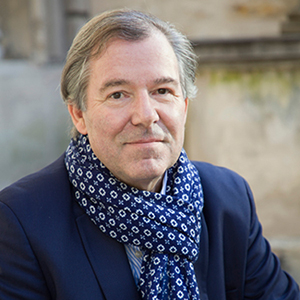Jérôme Garcin:
Addressing the public while avoiding insularity
POSTED ON 12.10.2025
He is an author, journalist, and has hosted Le Masque et la Plume for 35 years. Today, the Bernard Chardère Prize is awarded to him in recognition of his love of cinema, which he knows how to share with others.
 © DR
© DR
The figure of Bernard Chardère (s1930-2023), co-founder of Positif and the Institut, is celebrated annually in Lyon. Did you know him?
I remember what an incredibly warm and enthusiastic man he was, and his love for the world of Jacques Prévert... We corresponded quite a bit towards the end of his life. I was very fond of him.
You have received dozens of awards. What place will the Chardère occupy?
It’s the first one I have received in recognition of my work in cinema. Also, it’s an award that has been given in the past to dear friends, former film critics at Le Masque et la Plume, such as Michel Ciment and Daniel Heymann. It definitely connects me to those who were a bit like family to me. I'm very touched.
Thierry Frémaux had already suggested your name in the past.
But I didn't want to receive it while I was still on the air. Today, the timing is ideal, especially since Le Masque will be celebrating its 70th anniversary next month.
The award regularly is attributed to voices from France Inter: Eva Bettan, Christine Masson and Laurent Delmas...
The fact that Chardère took the time to acknowledge public broadcasting is remarkable. We need it more than ever.
Encouraging as many people as possible to enjoy culture has always been your credo.
And cinema in particular, yes, ever since I started out in print journalism at age 19.
How did your love of cinema come about?
I was incredibly lucky to grow up with a father who was a literary director and passionate about all aspects of culture. From a love of the written word, I moved on to a love of film, being active in countless film clubs... But the frantic need to ‘see everything’ began when I joined Le Masque. Ten films a week. And it’s lasted for 35 years. Incredible.
So we can count you among the cinephiles.
I became one from the moment I started hosting the show, because I felt I couldn't moderate a debate between critics who were all such experts without having seen everything.
And you got hooked.
Gradually, I started to give my opinion too. It wasn't necessarily my role, but it was a continuation of the pleasure or displeasure I felt when watching a film. I obviously loved moderating these debates, surrounded by these encyclopaedic minds. I had to be up to the task with all these sharp minds around me.
What is your most enduring memory associated with a cinema experience?
My most disturbing memory, perhaps the most personal and intimate, takes me back to when I was 17. My father was 45 and took me to see La Maison des Bories in a cinema at the top of Rue Saint-Jacques. It was a film by Jacques Doniol Valcroze, with Marie Dubois and Philippe Garrel. It wasn't a masterpiece, but it remains etched in my memory because it was associated with the last time my father and I were so close. A week later, he fell from his horse and died. I never wanted to see La Maison again. Until 2020, during lockdown; we were continuing to make Le Masque but limiting ourselves to classics. The film has clearly not improved with age, but the emotion attached to it overwhelmed me.
Cinema is shared through emotion, as you have just done. But it also requires some ‘bad faith’, doesn’t it?
Oh yes, the success of Le Masque relies on the critics' ability to do that. That's how they ensure the show goes on. We're addressing an audience, and out of respect for them, we have to avoid staying in our own bubble. Just make sure that behind the bad faith, there is always sincerity.
What explains the longevity of the programme?
The presence of the public, which makes it timeless, keeps it alive. You can't lie to them, you have to charm them, encourage them to go to the cinema. Even if it means getting criticised later for one’s preferences or tastes.
Interviewed by Carlos Gomez
Cinema event
AT THE FESTIVAL VILLAGE Sunday, 12 at 5 pm
A discussion with Jérôme Garcin,
journalist and recipient of the 2025 Bernard Chardère Prize

